'It's tough making people laugh'
Shobha Warrier
It is rare for an artiste to remain in the film industry for nearly five decades. It is rarer for an artiste to act in over a thousand films. 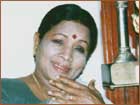
Manorama, one of the most famous and celebrated comediennes of Tamil cinema, is one towering persona in the industry.
For her part, the veteran artiste is unassuming, unpretentious, simple and warm. And serious! You would expect a veteran comedienne to crack jokes, right? Not Manorama, finds
Shobha Warrier:
You started acting at a very young age. Was it always your ambition to act in films?
To tell you the truth, I don't remember. It was so long ago!
I don't know whether I wanted to act in films as a child. But I used to sing very well then. So music drew me closer to acting. By the time I was 12 or 13, I was already acting and singing on stage. Gradually, a strong desire to act in films developed. So acting was accidental.
But I did not get a chance to act in a film till 1958. My first film was Maalayitta Mangai.
How did you get the break? Do you remember?
Yes, I canít forget my first film. Poet Kannadasan happened to see my play, Mani-makudam (written by his friend Kalaignar Karunanidhi), and immediately signed me for the film that he was making. S S Rajendran was my first screen hero.
You must have been very happy when Kannadasan offered you a role in Maalayitta Mangai?
Yes. Till then, I had only been acting as a heroine in plays, but Kannadasan gave me a comic role.
How did he realise that you had a flair for comedy?
I don't know. The truth is I didnít know I had the ability to act in a comic role. 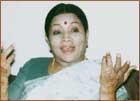 In those days, it was very difficult to get a chance to act in films. Nobody let go of a chance. So when I got it, I grabbed it.
In those days, it was very difficult to get a chance to act in films. Nobody let go of a chance. So when I got it, I grabbed it.
So I was not at all unhappy because I got only comedy roles. In fact, I was happy I got a break without struggle. I never dwelt much on why I didnít get the chance to act as heroine.
There are very few comediennes in Indian cinema. Did you prepare yourself in any way? Is it not difficult to make people laugh?
It is very, very difficult to make people laugh. Initially, I didnít know how to prepare. It was very difficult.
When people began appreciating what I was doing, I gained confidence. I started working hard on the roles. I also started experimenting and then looked for people's reaction.
Unlike other character artistes, our job is very difficult. The toughest job is to make people laugh.
It is only good rapport between the artistes that gives rise to good comedy.
The difference between character artistes and comedians is that the former has to stress carefully on dialogues and then say only what is there in the script. But it is our actions and dialogues that make people laugh. We have to add a lot to the scene as well as improvise.
But I have largely done what my directors have asked me to do. I just follow my coartistes and improvise my acting.
The Nagesh-Manorama pair has been a famous and popular one in Tamil cinema. Will you please tell us about those days?
Although I have acted with many comedians like Chandrababu, Cho, Thangavelu, Thengai Srinivasan, M R Radha, etc, what hit the jackpot was the Nagesh-Manorama pair.
You see, we used to rehearse a lot. And with each rehearsal, we improvised more and added more gags. We worked hard on jokes. Sometimes, we used to laugh so much that we couldn't rehearse. When a joke could make us laugh, we knew that it would click with the audience, too.
We had a great time till the real take.
I still remember Nagesh, V K Ramaswami and myself acting for a film called Mugharasi. Oh, God! How much we laughed while shooting for that film!
I donít think I have enjoyed any other film like this one. It was special.
Do you laugh when you see your films today?
Yes, I do. *laughs* 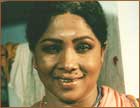
You are one actress who has acted with all the four Dravidian Chief Ministers of Tamil Nadu -- Annadurai, MGR, Karunanidhi and Jayalalitha. A rare honor, indeed!
Yes. It was in the play, Naan Kanda Hindu Raajyam, written by Anna himself, that I acted with him.
Kalaignar Karunanidhi and I played the main leads in Udaya Sooryan. The play was written by him. We acted together in several plays. I have also acted with both MGR and Jayalalitha.
What do you remember about the days when you acted with Karunanidhi?
The greatest experience of my acting career was that I grew up delivering the poetic and powerful dialogues written by Karunanidhi.
If people appreciate my dialogue delivery today, it's all because of Kalaignar. He was very insistent that we speak proper, pure Tamil. Even while rehearsing, he made sure that we spoke pure Tamil. It is only now that I realise the importance of his insistence.
These days, nobody speaks chaste Tamil. I wonder how Kalaignar tolerates this.
In those days, if we uttered one word wrong, he would correct it immediately. Nowadays, all those Sun TV comperes mutilate the language.
How was your experience working with MGR?
He was very cordial and friendly with everyone.
And Jayalalitha? Were you not acting when she joined films?
Yes. She was very friendly towards me. But she was always immersed in some book or the other. What struck me was her intelligence.
You know, I could learn all the dialogues of a full drama in just one night. People used to admire my memory.
But after I met her, I understood what memory is all about. I have seen assistant directors reading out the dialogues to her. She would repeat them verbatim, after listening to them once. It was amazing.
She was also very quick at grasping dance steps. The dance master and other girls would practice their steps in some corner. Ammu (that is what we call her) would be talking to me, occasionally watching them. When she was called for her shot, she could reproduce every step faithfully.
I used to tell her, "Ammu, let me go and practice the steps."
But she would ask me to stay back, "Mano, sit here and talk to me."
Then I would tell her, "Ammu, you just have to watch the steps from here. I have to rehearse them at least a couple of times. Let me do that!"
You have been acting for over four decades. What difference do you find in the films made then and now?
The main difference is the equipment -- they have become so sophisticated. Technically, we have advanced so much.
In those days, there was no dubbing. We had to learn all the dialogues by heart and deliver them while shooting for the film. When we were to shoot a scene, somebody would shout, "Silence!" and then start shooting.
Only when the sound engineer okayed the scene, would it be canned.
Now, it is so easy. There is no problem if we forget the dialogue or mess up the dialogue. Everybody leaves the flaws to be corrected at the dubbing theatre.
Also, there were no outdoor shoots then. Almost everything was shot inside the studios.
Is there any difference in the way artistes act? Acting has become more realistic and less melodramatic, hasn't it?
Yes, there is a difference in the way we act now.
Earlier, songs were more important than acting. Then came a time when we were expected to deliver dialogues beautifully, with great stress on accent, voice modulation, etc. We were expected to deliver them dramatically. But now, the young directors tell us not to overact!
So I am also changing my style with the times. But I have always enjoyed acting -- then and now.
Is there any difference in the attitude of the artistes of yesterday and today?
Yes. These days, the attitude is casual -- just Hi and Bye.
Earlier, we were so scared of the directors and heroes. Today, there is no difference between a director, an actor and a character actor. All are equal on the sets. It is a good change.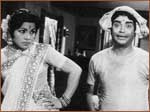
You have portrayed more than a thousand characters. Is there any favourite?
People say that Jil Jil Ramamani in Thillana Mohanambal is my best performance. I think so, too.
But I am attached to all my characters. I also like my role in Chinna Gowndar as Vijayakantís mother. That was one character which really touched my heart.
You have acted as mother to so many actors. Do you have any special love for any son of yours?
No, no! I have so many sons. How can I choose one among all of them? Rajnikant, Kamal Haasan, Satyaraj, Prabhu, Murali, Sharat Kumar, ParthipanÖ the list goes on.
I wonít differentiate between any of them. All are equal to me; I love all of them.
How do you feel when you are not acting?
Horrible. If there is no shooting for four days, I feel restless. I feel energetic only when I am shooting.
See, I have been acting for over four decades. I am so used to the arc lights that I cannot think of a life without films. Remember I have been in this profession since I was 12.
When I am not shooting, I take my family to visit temples! 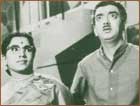
I cannot sit idle at home; I have to go out somewhere. I have visited 108 Amman kovils (temples) till today.
Photograph: Sreeram Selvaraj